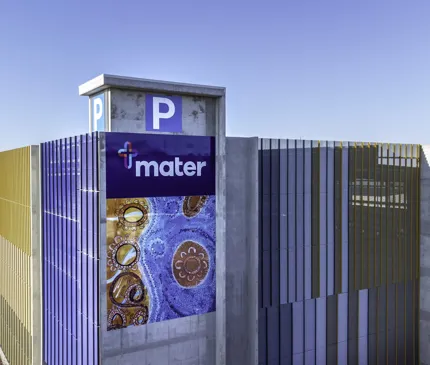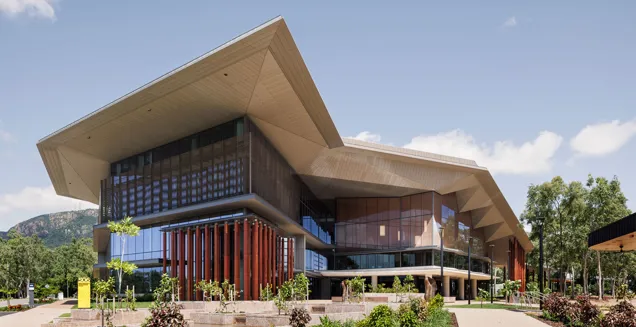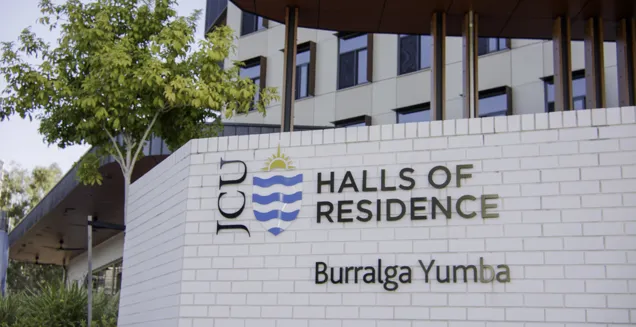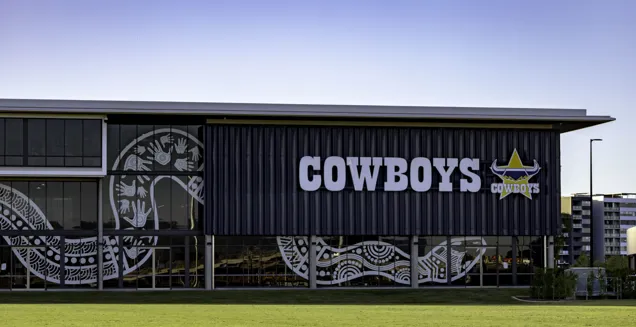Multi-Storey Car Park
Discover Mater Private Hospital Townsville’s completed multi-level car park project, a milestone achieved by Mater Health in North Queensland.
March 2020
Social Infrastructure
Townsville, QLD (Gurambilbarra)

NAIF's $19.8 million loan played a crucial role in the completion of the Mater Health Multi-Storey Car Park project in Townsville, QLD. This project, now successfully completed, enhances the region's social infrastructure, creating employment opportunities, and driving public benefit.
About Mater Health
Mater operates Queensland’s largest not-for-profit network of public and private hospitals and healthcare services. Bringing together expertise across health, education and research, Mater is guided by a vision to empower people to live better lives through improved health and wellbeing.
With people at the centre of its services, Mater continues to adapt and innovate to meet the evolving needs of communities, delivering care, programs and services that go beyond the hospital environment.
Mater Private Hospital Townsville is a not-for-profit entity and an integral part of the Mater Health network; the hospital has a rich history and is strongly committed to providing compassionate care to those in need.
Project Overview
The project forms part of Mater Private Hospital Townsville’s $116 million Pimlico campus staged redevelopment under the Pimlico Master plan and resulted in the addition of a new six-level car park to the Mater Hospital. This has assisted in reducing congestion in surrounding neighbourhoods and improving employee safety.
The car park at the Pimlico campus is a significant piece of infrastructure that allows improved accessibility for patients and visitors. This project is an integral part of the 10-year master plan, which enables continued growth, demonstrated most recently through the Mercy Centre which offers a new Queensland X-ray facility, digital operating theatres, a new day surgery unit, and a new hospital entrance.
How We Helped
We provided concessional finance with a longer loan tenor and flexible terms.. This support enabled Mater Misericordiae Ltd to deliver a multi-storey car park at its Townsville campus, improving access to essential health services.
NAIF’s role included de-risking the project by structuring finance to align with long-life community infrastructure, encouraging investment by providing early confidence to proceed with construction and offering expertise and guidance to help shape the project’s financial structure and delivery.
Through this support, the Mater Multi-Storey Car Park was built to provide modern, reliable parking facilities that enhance patient, visitor and staff access, supporting the long-term delivery of health services to the Townsville community and wider North Queensland region.
Public Benefit
The project is expected to create 12 full-time jobs during construction and opportunities for up to 40 local apprentices and up to 740 subcontractors. A further two full-time ongoing jobs will be created during operations, as well as other indirect jobs due to the improved car parking amenities on offer.
The Mater car park would not have been possible without the support and funding through NAIF. It's been really great for our staff and our patients to have access to a car park so close to the facility.
Stephanie Barwick
General Manager, Mater Townsville
Related Links
Indigenous Engagement
- The Wulgurukaba people
Townsville, located in North Queensland, lies on the traditional lands of the Wulgurukaba and Bindal peoples. The Mater Hospital is situated on Wulgurukaba Country, known as Gurrumbilbarra. The Wulgurukaba people, whose name means "canoe people," have deep-rooted cultural ties to both the mainland coast and Yunbenun (Magnetic Island), with strong connections to the saltwater country and the surrounding marine ecosystems, including the Great Barrier Reef. Their creation story features Gabul, the ancestral carpet snake, who is believed to have shaped significant parts of the region’s coastal landscape, including Magnetic Island and the Hinchinbrook Channel. Today, Townsville remains an important meeting place for many First Nations communities across North Queensland, providing essential services such as health care, education, and employment opportunities.
Indigenous Engagement Strategy Commitments
- Committed to 3% First Nations employment during the construction phase and the implementation of a two-stage procurement process aimed at enhancing Indigenous contracting and participation within the project's supply chain.
- Committed to supporting up to ten scholarships for First Nations students pursuing a Diploma of Nursing, along with support for students studying Certificate II and III in Primary Health, including work experience opportunities.
- Drive key initiatives including establishing a local Aboriginal and Torres Strait Islander Reference Group, developing a Reconciliation Action Plan, and providing cultural competency training to enhance staff understanding and capacity for Indigenous engagement.
Indigenous Engagement Strategy Outcomes
- In 2021 and 2022, Mater and contractor Paynters established strong links with Cowboys House and created pathways into the construction industry, helping to achieve 25% First Nations employment. Mater also commissioned artworks from Meriam artist Gail Mabo, including a piece that reflects the Townsville region’s four Traditional Owner groups – the Wulgurukaba, Bindal, Nywaigi, and Gugu-Badhun peoples. This artwork is prominently displayed on a three-story façade along the side of the car park.
- In late 2022, Mater Education supported First Nations students through various programs, including helping two graduates complete a Diploma of Nursing and four students achieve a Certificate III in Healthcare Assistance, in collaboration with the SEED Foundation Australia.
- In 2023, Mater continued to advance educational outcomes by supporting training and employment pathways into the health sector. This included scholarships for First Nations students undertaking a Diploma of Nursing, as well as Certificates II and III in Primary Health and Hospital Administration.
- In 2024, Mater’s Indigenous Liaison Officer began strengthening local connections and developing culturally appropriate support resources.
- An indirect outcome of the project was the creation of the not-for-profit organisation Set to Succeed, established to support First Nations youth from remote communities by providing housing solutions for those entering the workforce or commencing tertiary studies in Townsville.
- Mater Private Hospital Townsville has appointed an Aboriginal and Torres Strait Islander Liaison Officer as a support for staff, patients, and visitors, and for improved engagement with both staff and the community.


